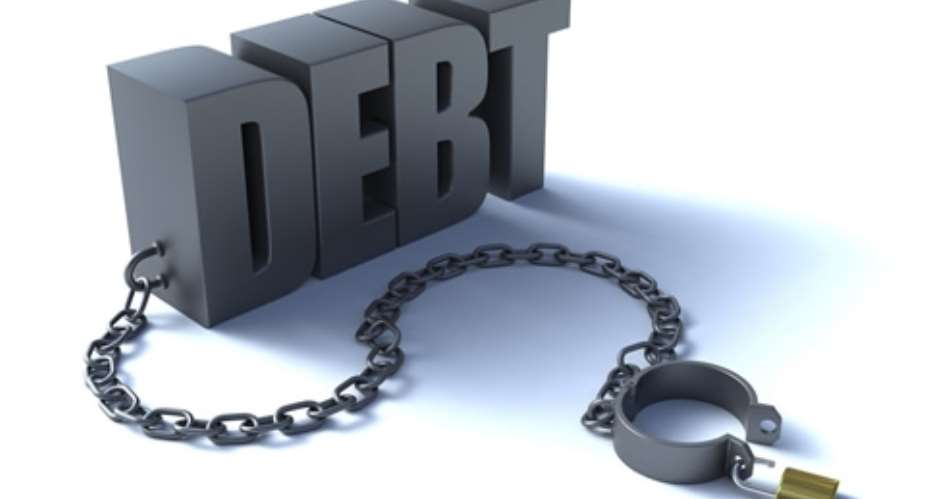Rising public debt -- more than 60 percent of GDP -- as well as an “unsustainable” debt service strategy could push the country into a debt crisis, a situation where it will be unable to settle its debts, Raziel Obeng-Okon, an economist who lectures at GIMPA has warned.
The country's total debt stock as at September last year is about 60.8 percent of GDP, translating to more than GH¢69billion including interest payments, which puts a severe strain on government's finances.
This year, government has budgeted about GH¢9.58billion as interest payment on debt, which is more than what it could possibly raise from external loans and grants -- GH¢8.3billion.
“It means that all the loans and grants anticipated will only go to service the interest payments. Currently, Ghana is borrowing to refinance interest and principal repayments in an unsustainable manner,” explained Dr. Obeng-Okon, who lectures in public accounts.
Total interest payment, according to the Finance Ministry, is estimated at GH¢9,557.2million, equivalent to 7.1 percent of GDP and 24.4 percent of total expenditure. Of this amount, GH¢1,543.2million will be expended on external interest, while GH¢8,014.0million will be for domestic interest payments.
The country's total public debt stock as a percentage of GDP increased from 36.3 percent in 2009 to 48.03 percent in 2012, and further to 55.53 percent the year after.
The Finance Ministry has attributed the rapid rise in public debt in recent years to an increase in external net disbursements for infrastructure projects and net domestic issuance, as well as depreciation of the cedi.
The central bank Governor Kofi Wampah however maintained a calm posture when asked about sustainability of the country's total debt.
“We need fiscal consolidation to lower debt and interest rates will also fall; then exchange rates will also stabilise, and hence external debt will also stabilise. So, stability will reduce the size of [public] debt and also servicing of the debt,” he said.
Finance Minister Seth Terkper, in the 2015 budget, admits there is an increasing debt service to revenue ratio that will require swift fiscal adjustments in order to put the economy on a path of sustainable public debt in the medium-term.
More debt
Dr. Obeng-Okon's comment was in reaction to BoG's announced plan to borrow more than GH¢25billion from the domestic market within the first six months of 2015 as against the GH¢14.3billion the government borrowed through the issuance of securities in the same period last year.
According to Dr. Obeng-Okon, notwithstanding the looming crisis, there appears to be a good appetite for the bond sale among foreign investors who usually patronise these bonds in Ghana.
“Foreign investors continue to see Ghana as a good investment destination in Africa in terms of political stability and the medium-term prospects of the economy, with the emergence of more oil discoveries which may increase oil output significantly in the futu.
“The high expected interest rates offered by these bonds usually attract both local and foreign investors alike. In 2015, investors are likely to still patronise Fixed Income Instruments including bonds,” he said.





 Meta releases new version of conversational AI across its platforms
Meta releases new version of conversational AI across its platforms
 Cape Town named Africa’s Best Airport 2024 by Skytrax
Cape Town named Africa’s Best Airport 2024 by Skytrax
 Bono East: Four injured after hearse transporting corpse crashes into a truck
Bono East: Four injured after hearse transporting corpse crashes into a truck
 ‘Be courageous, find your voice to defend our democracy’ — Sam Jonah urges journ...
‘Be courageous, find your voice to defend our democracy’ — Sam Jonah urges journ...
 Exodus of doctors, nurses and teachers have worsened because of unserious Akufo-...
Exodus of doctors, nurses and teachers have worsened because of unserious Akufo-...
 2024 election: Avoid insults, cutting down people in search of power – National ...
2024 election: Avoid insults, cutting down people in search of power – National ...
 ‘You passed through the back door but congratulations’ — Atubiga on Prof Jane Na...
‘You passed through the back door but congratulations’ — Atubiga on Prof Jane Na...
 Government’s $21.1 billion added to the stock of public debt has been spent judi...
Government’s $21.1 billion added to the stock of public debt has been spent judi...
 Akufo-Addo will soon relocate Mahama’s Ridge Hospital to Kumasi for recommission...
Akufo-Addo will soon relocate Mahama’s Ridge Hospital to Kumasi for recommission...
 We must not compromise on our defence of national interest; this is the time to ...
We must not compromise on our defence of national interest; this is the time to ...
